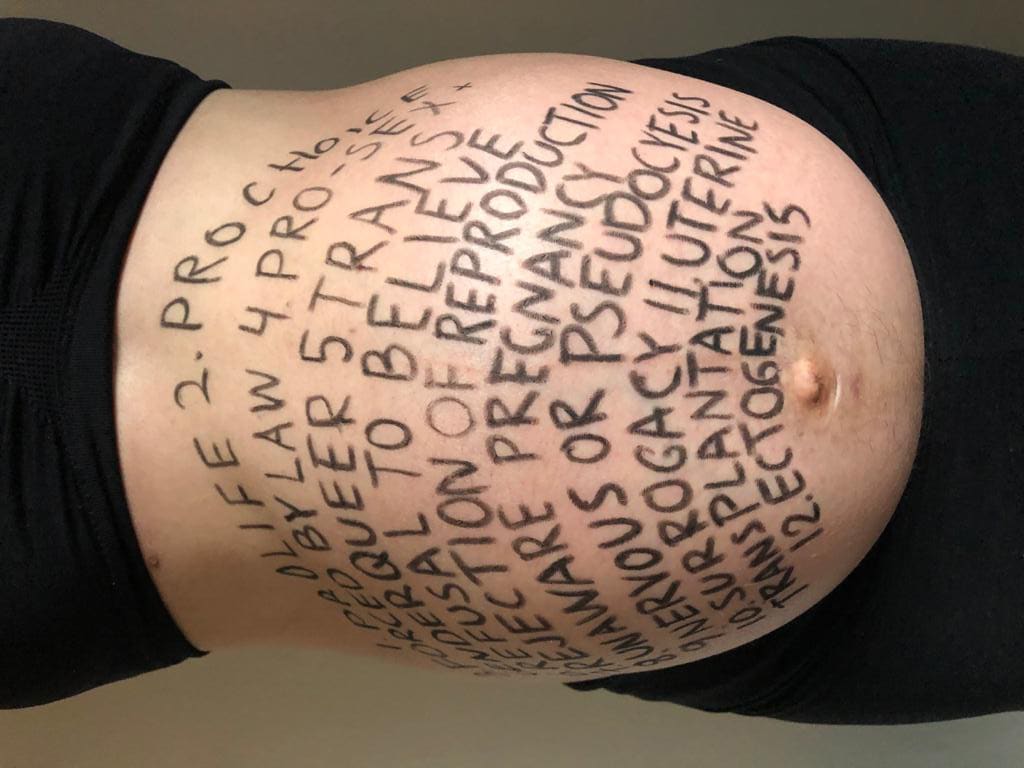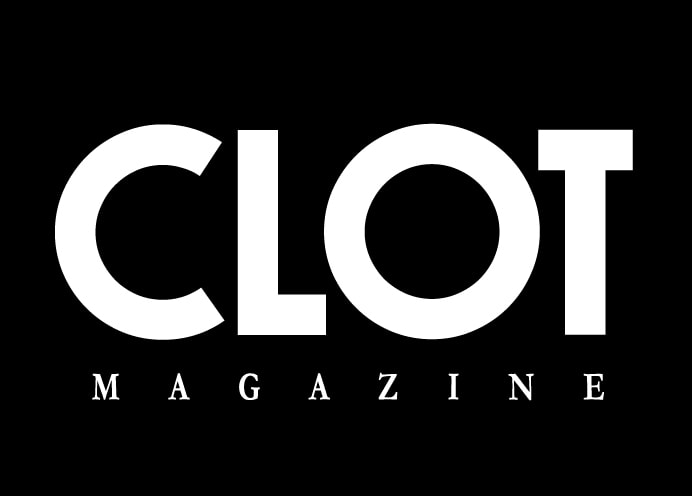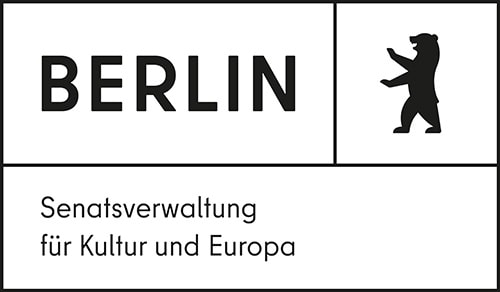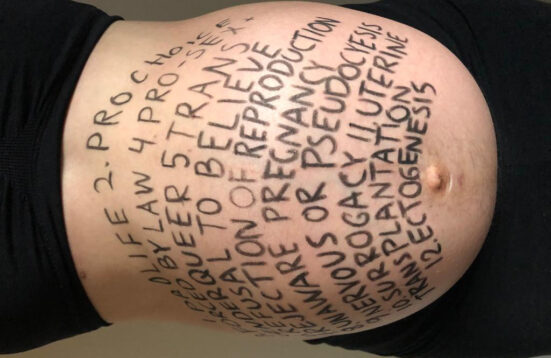PERMEABLE BODIES
Reading Group UNBORN0x9
Live-Performance (online) | Reading Group SURROGACY, with Anindita Majumdar

Helen Kaplinsky’s belly
Art Laboratory Berlin welcomes you to a live-streamed Reading Group session on 18 November 2023, from 4 – 6 pm CET. This event is the final event of the Reading Group SURROGACY that met online for four weeks.
In context of our series PERMEABLE BODIES, Art Laboratory Berlin launches a series of online reading groups as fork-out project of UNBORN0x9 shown in the exhibition Matter of Flux. Initiated by Shu Lea Cheang and Ewen Chardronnet with Future Baby Production, UNBORN0x9 reflects on the techno-scientific developments in obstetrical medicine, its social, cultural, philosophical and prospective implications and to offer an artistic view of the science in the making. During 2021-2022, UNBORN0x9 was part of the EU platform ART4MED.eu, which focuses on a methodological framework that fosters collaboration between artists, health and biomedical researchers. The online reading group aims to enable cross-border knowledge exchange – across nations, races, genders, real and virtual borders. For the studies in three specific topics – Ultrasound, Ectogenesis, Surrogacy, the online web platform incorporates reading materials, co-writing pads and online chats as multiple interface entries. Guided by a LEADER with 10 registered READERS, the online reading group aims for in-depth research/studies and motivates public debate on these topics of concern.
The third online reading group with the focus on Surrogacy is ongoing from 16 October 2023 for one month duration, ending with a online performance on 18 November 2023. We have invited Dr. Anindita Majumdar as the LEADER of the Surrogacy reading group.
Project web platform:
UNBORN0x9, http://unborn0x9.labomedia.org
Dr Anindita Majumdar
Anindita Majumdar is Associate Professor, Department of Liberal Arts, Indian Institute of Technology Hyderabad. She has been researching on commercial surrogacy, kinship and infertility since 2010. Her book based on her ethnographic research was published in 2017 by Oxford University Press, and is titled Transnational Commercial Surrogacy and the (Un)Making of Kin in India. The book was based on her doctoral research, and was awarded the ‘Distinction in Doctoral Research Award’ in 2016 by the Indian Institute of Technology Delhi. The monograph was also shortlisted for the Bloomsbury LSE Social Anthropology Monograph Award 2016.
Anindita was invited to contribute to the Oxford India Short Introductions Series on Surrogacy, which was published in 2019. She is currently researching and writing on the linkages between ageing and assisted reproductive technologies in India: including fieldwork in North India amongst post-menopausal couples who became pregnant through the use of assisted reproductive technologies. The research was funded by Wellcome UK, along with a parallel research on the biological clock and infertility treatment in South India supported by the Indian Council for Social Science Research (ICSSR).
Recently, Anindita co-edited and edited five special issues on kinship, population and reproductive ageing with Contemporary South Asia, Anthropology and Aging, Asian Journal of Women’s Studies, Reproductive Biomedicine and Society Online and Asian Bioethics Review. She is on the international advisory board of the journal Medicine, Anthropology, Theory, and is an external member of Center for Reproductive Health (CORTH) at the University of Sussex. In 2023, she was Social Sciences and Public Policy Global Visiting Fellow at the Department of Global Health and Social Medicine at King’s College London.
On Surrogacy
In reviewing the commercial surrogacy industry which generates an estimated two billion dollars a year, we bring the issues of labor, motherhood, ownership, access and control upfront for debate. There are many controversies over issues and laws surrounding surrogacy in the field of assisted reproduction. Commercial surrogacy is a development that has exploded in countries like India, Canada and China.
Concerned by the recent and fast rise of surrogacy in Nigeria, law specialist Adebanke Adewumi, in her essay “An Appraisal of socio-legal issues in surrogacy as a method of assisted reproductive technology”, addresses on a broader spectrum the legal and ethical issues of surrogacy as a method of assisted reproductive technology and examines the relevant domestic and international legislations, instruments and cases. She points that one should never forget that “Although pregnancy is a natural process, it process usually induces some risks. The decision a woman makes to become pregnant is that she’s prepared to face the risks. Unfortunately in surrogacy the surrogate mother bears the risks without the natural benefit of motherhood, because she will eventually give the baby child to the party as agreed on.” France Winddance Twine in her book, Outsourcing the Womb, further investigates the complexity that race/class/gender, religion, legal regimes, biopolitics and global capitalism play in the gestational surrogacy market. Nevertheless, according to American ethnographer Elly Teman, it is possible to see surrogacy as “dyadic body project” that can be “collaborative, dual forms of identity-work”. In Birthing a Mother: The Surrogate Body and the Pregnant Self she reveals that as surrogates psychologically and emotionally disengage from the fetus they carry, they develop a profound and lasting bond with the intended mother. Taking on the queer feminist view, Sophie Lewis in her recently published Full Surrogacy Now (Verso, 2020) unabashedly calls for family abolition, “queer polymaternalism” and “gestational communes” in order to arrive at a speculative future in which we achieve the “plural womb and a world beyond propertarian kinship and work alienation”. She asks to “bring about the conditions of possibility for open-source, fully collaborative gestation”, because “[i]t is the political struggle for access and control—the commoning or communization of reprotech—that matters most.”
Relevant Literature
Thapar-Björkert, S., Majumdar, A., & Gondouin, J. 2023. “There are two sides to everything”: Re (locating) vulnerability in the surrogacy industry in India. Feminism & Psychology, 0(0).
Konig, Anika and Anindita Majumdar. 2022. Paperwork: Following the trail of (identity) papers in transnational commercial surrogacy. International Journal of Comparative Sociology, 63 (5-6): 247-264.
Majumdar, Anindita. 2022. “Surrogacy as Labor.” In Oxford Research Encyclopedia of Anthropology. Oxford University Press. Article published April 20. https://doi.org/10.1093/acrefore/9780190854584.013.169
Nair, Gayatri, Paro Mishra and Anindita Majumdar. 2020. ‘Risk: care: responsibility: solidarity? Essential labour during the COVID-19 pandemic in India’, The Sociological Review, 2 July 2020. (https://www.solidarityandcare.org/stories/essays/risk-care-responsibility-solidarity-essential-labour-during-the-covid-19-pandemic-in-india )
Majumdar, Anindita. 2018. ‘Conceptualizing surrogacy as work-labour: Domestic labour in commercial gestational surrogacy in India’,Journal of South Asian Development, 13(2): 1-18.
Majumdar, Anindita. 2019. Surrogacy: Oxford India Short Introductions. New Delhi: Oxford University Press.
Majumdar, Anindita. 2017. Transnational Commercial Surrogacy and the (Un)Making of Kin in India. New Delhi: Oxford University Press.
Majumdar, Anindita. 2016. ‘Surrogate mothers and gay fathers: Navigating the commercial surrogacy arrangement in India’, in Adi Moreno and Susanne Hofmann (Eds),Intimate Economies: Bodies, Emotions and Sexualities on the Global Market (pp. 213-231). UK: Palgrave Series on Globalization.
Majumdar, Anindita. 2015. Waiting for the womb: Representing assisted reproduction in the infertility clinic waiting room. India International Centre Quarterly, 42(2): 87–97.
Majumdar, Anindita. 2015. ‘In no-man’s land: Citizens and kin in transnational commercial Surrogacy in India,’ Contemporary South Asia 23(4): 442-455.
Majumdar, Anindita. 2014. ‘Nurturing an alien pregnancy: Surrogate mothers, intended parents and disembodied relationships’, Indian Journal of Gender Studies, 21 (2): 199–224.Majumdar, Anindita. 2013. Transnational surrogacy: The “public” selection of selective discourse. Economic and Political Weekly, XLVIII (45&46): 24–27.
UNBORN0x9, http://unborn0x9.labomedia.org
Matter of Flux, Art Laboratory Berlin, 26 May – 9 July 2023
The 1st Reading Group on ECTOGENESIS took place from 27 April – 27 May 2023.
The 2nd Reading Group on ULTRASOUND took place from 15 June – I5 July 2023.
The 3rd Reading Group on SURROGACY took place from from 16 October – 18 November 2023.









